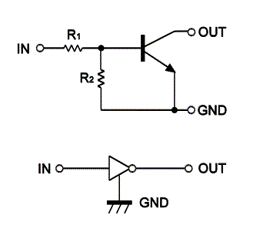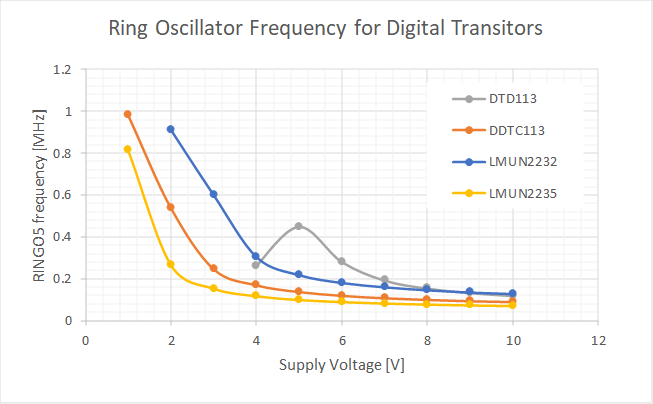Digital transistors look extremely appealing to build discrete logic: They come with integrated resistors so the bias emitter in an RTL gate can be omitted. Furthermore, they are available from many manufacturers in basically any package type, down to chip scale packages, at very lost cost.
There is a nice introduction to digital transistors by Rohm here.
 The internal circuit of such a device is shown above. A wide variety of value for R1 and R2 are available. Unfortunately, the minum value for R1 is 1 kOhm, which will already limits switching currents significantly.
The internal circuit of such a device is shown above. A wide variety of value for R1 and R2 are available. Unfortunately, the minum value for R1 is 1 kOhm, which will already limits switching currents significantly.
Furthermore, although many different variants are listed, not all of those are available. I picked four devices at random from different suppliers.

The candidates are listed above. What is alarming about these devices is that basically no information about transient behavior and switching applications is listed. A few devices liste transistion frequencies, which are rather unimpressive.
 Ring oscillator results are shown above. Basically all devices enter an operational range where they are limited by saturation charge already at very low voltage. Practical gate propagation delays are in the 500-1500 ns range, a hundred times slower than the PMBT2369! There is a very small voltage range where the saturation charge does not dominate and the devices are slightly faster, but it seem impractical to bias devices into that regime.
Ring oscillator results are shown above. Basically all devices enter an operational range where they are limited by saturation charge already at very low voltage. Practical gate propagation delays are in the 500-1500 ns range, a hundred times slower than the PMBT2369! There is a very small voltage range where the saturation charge does not dominate and the devices are slightly faster, but it seem impractical to bias devices into that regime. These results are honestley a bit surprising to me, since I always though the main application of digital transistors would be switching? Well, maybe cost is more important than speed here.
Verdict: Digital transistors are not suitable for discrete logic, unless you are fine with clockspeeds in the kHz range.
 Tim
Tim
Discussions
Become a Hackaday.io Member
Create an account to leave a comment. Already have an account? Log In.